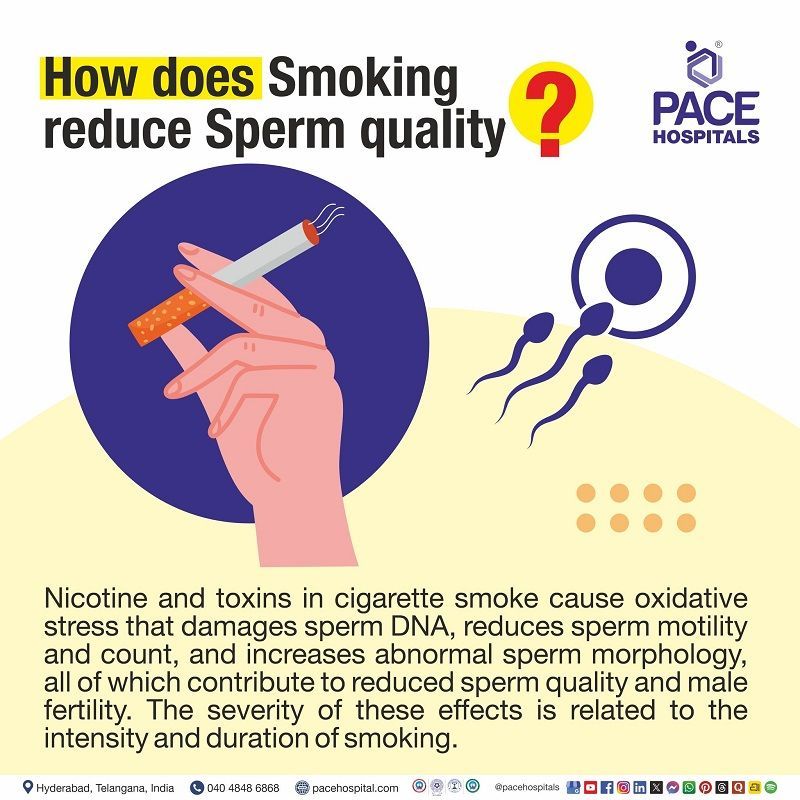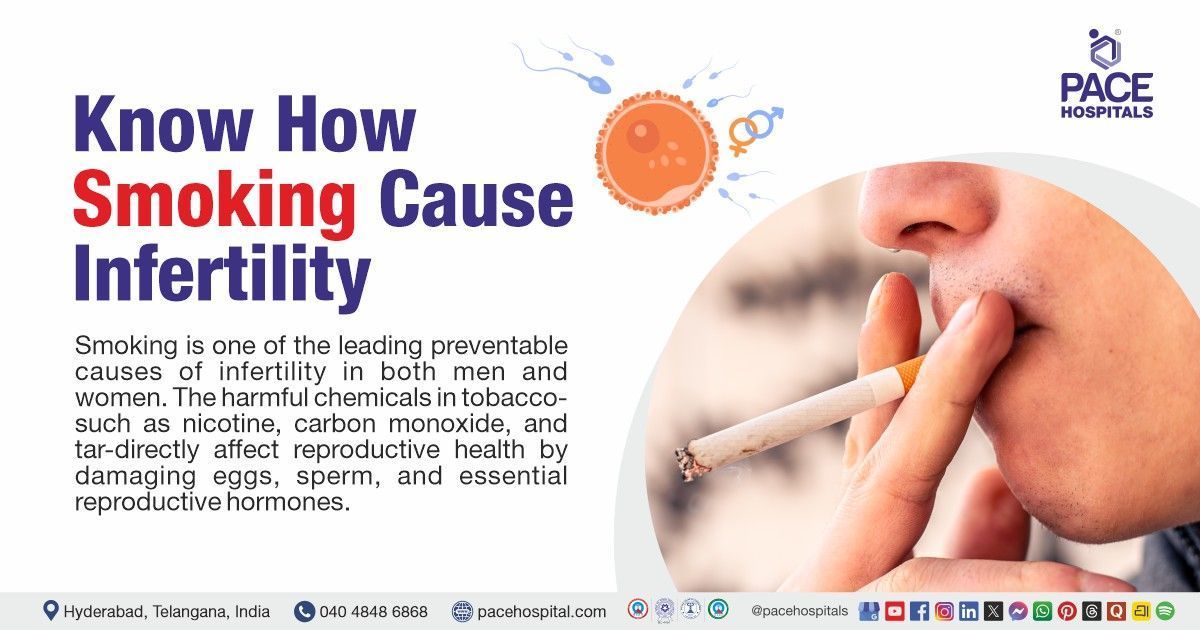Smoking Causes Infertility – Expert Insights on Reproductive Health
PACE Hospitals
Written by: Editorial Team
Medically reviewed by: Dr. Abhik Debnath - Consultant Urologist, Endourologist, Andrologist & Kidney Transplant Surgeon
Overview
Smoking is one of the leading preventable causes of infertility in both men and women. The harmful chemicals present in tobacco—such as nicotine, carbon monoxide, and tar—directly affect reproductive health by not only damaging eggs and sperm but also essential reproductive hormones.
At PACE Hospitals, Hyderabad, fertility specialists and reproductive endocrinologists emphasize that quitting smoking is one of the most important lifestyle changes to improve fertility outcomes, whether you're trying to conceive by natural way or through assisted reproductive technologies like IVF or ICSI.

How Smoking Affects Fertility
Impact on Male Fertility
Cigarette smoke contains over 7,000 harmful chemicals, many of which damage the sperm DNA and reduce sperm count and motility.
- Reduced sperm count: Smokers often have up to 20% lower sperm concentration than non-smokers.
- Poor motility: Nicotine and heavy metals like cadmium reduce sperm movement, lowering the chance of fertilizing an egg.
- Abnormal morphology: Smoking increases the number of abnormally shaped sperm, which cannot penetrate or fertilize the egg properly.
- Hormonal imbalance: Smoking alters testosterone and gonadotropin levels, disrupting sperm production.
- Erectile dysfunction (ED): Nicotine constricts blood vessels and reduces penile blood flow, leading to erection problems.
Impact on Female Fertility
In women, smoking accelerates ovarian aging, decreases the number and quality of eggs, and interferes with hormone balance.
- Egg damage: Toxic chemicals reduce ovarian reserve and cause premature depletion of healthy eggs.
- Hormonal disruption: Nicotine interferes with estrogen and progesterone production, affecting ovulation.
- Fallopian tube damage: Smoke exposure impairs ciliary movement in fallopian tubes, increasing the risk of ectopic pregnancy.
- Uterine lining damage: The uterus may not be able to support implantation of a fertilized egg.
- Earlier menopause: Smokers may experience menopause 1–4 years earlier than non-smokers.
Smoking and IVF Success Rates
Smoking drastically reduces success rates in in-vitro fertilization (IVF) and other fertility treatments. Studies show that women who smoke need twice as many IVF cycles to conceive compared to non-smokers.
For men, poor sperm DNA quality from smoking leads to higher embryo fragmentation and lower pregnancy success rates.
At PACE Hospitals, fertility specialists advise couples undergoing IVF or ICSI to quit smoking at least 3–6 months before starting treatment to allow sperm and egg regeneration.
Effects of Passive Smoking on Fertility
Passive or secondhand smoke exposure can be just as harmful.
- Women exposed to smoke have a 20–25% lower fertility rate.
- Men exposed regularly may have a reduction in sperm motility and increased oxidative stress.
- Pregnant women exposed to smoke have a higher risk of miscarriage, premature birth, and low birth weight babies.
Even if you don’t smoke, staying around smokers can affect your reproductive health and pregnancy outcomes.
Quitting Smoking – Steps to Regain Fertility
The good news is that fertility often improves after quitting smoking. The body begins to repair itself within weeks of stopping tobacco use.
For Men:
- Sperm count and motility start improving within 2–3 months.
- DNA damage in sperm reduces, improving the chances of healthy conception.
For Women:
- Hormone levels normalize, and ovulation improves within a few menstrual cycles.
- The risk of miscarriage and ectopic pregnancy decreases significantly.
PACE Hospitals offers smoking cessation counseling, fertility screening, and lifestyle modification programs to help couples improve their chances of conception naturally or with medical support.
Other Lifestyle Factors That Combine with Smoking to Reduce Fertility
- Excessive alcohol consumption
- Poor diet and lack of exercise
- Sleep deprivation and stress
- Environmental toxins and pollution
- Long-term use of certain medications without medical guidance
A holistic approach—balanced diet, physical fitness, stress control, and tobacco cessation—greatly enhances reproductive health.
Long-Term Reproductive Consequences of Smoking
If smoking continues, it can lead to irreversible damage:
- Permanent reduction in sperm and egg count
- DNA mutations that increase birth defects
- Early menopause and hormonal imbalance
- Infertility even after quitting for long periods if damage is severe
- Increased risk of miscarriage, stillbirth, and preterm delivery
How PACE Hospitals Helps
At PACE Hospitals, Hyderabad, our reproductive specialists provide a comprehensive fertility assessment, including:
- Semen quality check analysis for smokers
- Ovarian reserve testing using AMH levels and ultrasound scan
- Hormonal profiling test and oxidative stress evaluation
- Personalized quit-smoking or stop-smoking support programs
- Fertility preservation options (egg or sperm freezing) for those unable to quit immediately
Our multidisciplinary approach ensures an integrated complete care for couples affected by smoking-related infertility.
Conclusion
Smoking doesn’t just harm your lungs and heart—it severely damages your fertility. Every cigarette reduces your chance of conceiving naturally or through IVF.
However, quitting smoking and adopting a healthy lifestyle can reverse much of the damage and improve your reproductive health.
If you are planning for pregnancy or struggling with infertility, visit PACE Hospitals, Hyderabad, for expert counseling, advanced fertility evaluation, and comprehensive treatment tailored to your needs.
FAQs on the Link Between Smoking and Infertility
How long after quitting smoking does fertility improve?
Fertility typically improves within 3–6 months after quitting, though it may take longer for some depending on prior smoking duration and health condition.
Can smoking affect IVF or ICSI success rates?
Yes. Smokers often have lower IVF success rates and even higher chances of miscarriage risks. Quitting smoking can significantly improve fertility outcomes and the chances of a successful pregnancy.
Does passive smoking cause infertility?
Yes. Regular exposure to secondhand smoke affects hormone levels and sperm or egg quality, reducing fertility even in non-smokers.
Can smoking during pregnancy harm the baby?
Absolutely. Smoking increases risks of miscarriage, premature birth, low birth weight, and long-term developmental issues in the child.
What tests help evaluate smoking-related infertility?
Tests include semen analysis, AMH test, hormone profile, and ultrasound scans. These are available at PACE Hospitals, Hyderabad.
Can smoking cause infertility in both men and women?
Yes. Smoking affects sperm count, motility, and DNA quality in men, and damages eggs, hormones, and ovulation in women, leading to infertility.
How does smoking reduce sperm quality?
Nicotine and toxins in cigarettes cause oxidative stress that damages sperm DNA, decreases motility, and leads to abnormal sperm shapes.
Does quitting smoking improve fertility?
Yes. After quitting, sperm and egg quality begin to recover within a few months. Many couples conceive naturally after stopping smoking.
Are e-cigarettes or vaping safer for fertility?
No. E-cigarettes still contain nicotine and harmful chemicals that can damage sperm, eggs, and reproductive hormones.
Where can I get help to quit smoking and improve fertility?
You can consult fertility specialists at PACE Hospitals, Hyderabad for personalized cessation counseling and fertility care. Book an appointment at https://book.pacehospital.com/ or call +91 40 4848 6868.
Share on
Request an appointment
Fill in the appointment form or call us instantly to book a confirmed appointment with our super specialist at 04048486868
Appointment request - health articles
Recent Articles











